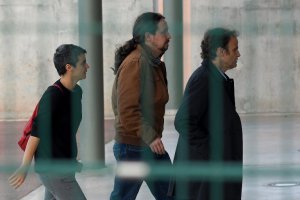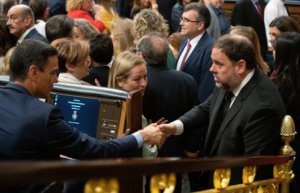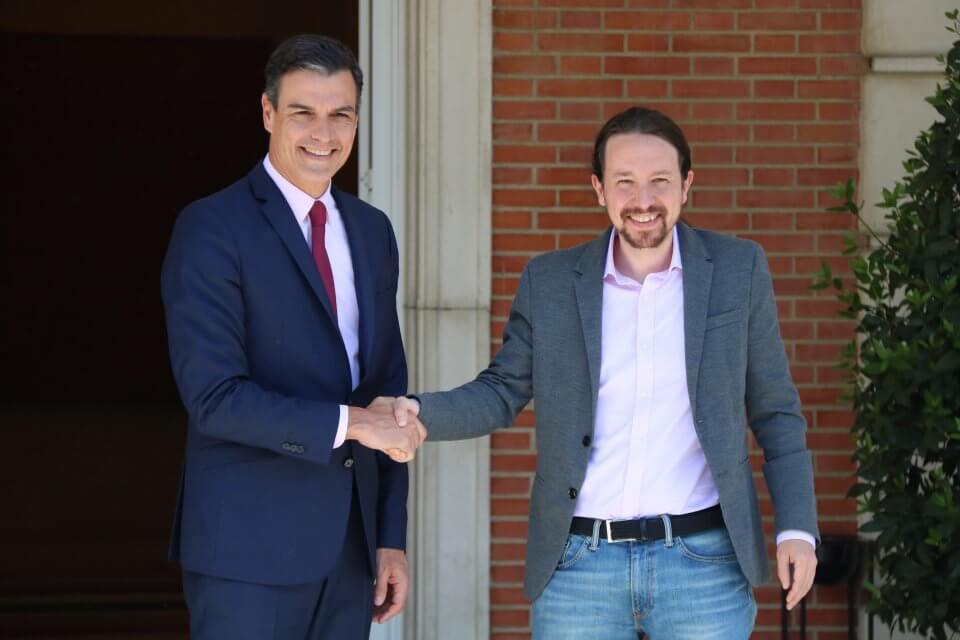As Spain braces itself for its fourth general election in just as many years, one has to look at Catalonia and the Catalan independence movement to understand why parties in Madrid have not yet been able to form a stable government after a 5-month political deadlock.
Pedro Sánchez, Spain’s acting prime minister and leader of the Socialist (PSOE) party, spoke on Tuesday night to confirm that he falls short of the support needed to be re-elected as head of the executive by MPs in the Spanish Congress.
He blamed his right-wing rivals – the People’s Party (PP) and Ciudadanos (Cs) – for the stalemate: ‘For the Spanish government to not depend on pro-independence parties, their abstention was needed.’
ALSO READ: Focus: Sánchez ‘rollercoaster’ and Spain’s ‘political instability’
Yet even when pro-independence groups are kept out of the equation, parties in Spain have been fighting over their different approaches to the Catalan independence crisis and how it should be addressed.
This will certainly be one of the central and most divisive issues in the upcoming electoral campaign ahead of the new election on 10 November.
When the PSOE party won the last general election on 28 April, nobody really doubted that Sánchez would be re-elected as prime minister, with the only question being what role the left-wing Podemos party would play – as coalition partners in government, or as parliamentary allies in Congress?
ALSO READ: Spanish election [28 April] campaign: ‘political police’, Catalonia and far-right
It ended up being none of the above. Forming a government is easier said than done, and negotiation was soon poisoned by mutual mistrust. Their different stances on the Catalan political conflict didn’t help.
The PSOE rejected a coalition government alleging ‘important differences’ in their approach to ‘state matters’ (in other words, Catalonia).

Whilst Podemos have defended the need for a self-determination referendum in Catalonia, the PSOE have always dismissed such a possibility as unconstitutional.
They also have different approaches to the imprisonment of independence leaders who organised a referendum despite Spain’s opposition in October 2017: the leader of Podemos Pablo Iglesias has called for their release, calling them ‘political prisoners’. He has also visited Oriol Junqueras in prison. Pedro Sánchez, meanwhile, has said the matter is up to judges’ criteria.
ALSO READ: Catalonia, the ‘electoral weapon’ in Andalusia
After two years in pre-trial detention, the Catalan leaders will know their verdict in October, and lengthy prison sentences are expected. The announcement is set to have great political implications, with major protests expected throughout Catalonia.
The PSOE view the verdict’s announcement and its consequences to be the perfect storm in any form of shared government with Podemos, some of whose members have even declared themselves in favour of Catalan independence.
Instead, the verdict will come out a few days before the electoral campaign kicks off, with the PSOE and Podemos free to defend their position in front of their would-be voters.

ALSO READ: Sánchez: 110 election pledges without mentioning Catalonia
Sánchez has also looked to his right when looking for culprits behind his failure to form a government: Ciudadanos (Cs) and the People’s Party (PP).
Whilst Podemos called Sánchez out for taking too strict of a stance on Catalonia, the right-wing parties have accused him of being too amicable.
ALSO READ: Spain’s right and far-right unite at Madrid rally
PP and Cs repeatedly claimed Sánchez had ‘hidden pacts’ with ‘parties that want to destroy Spain’.
The rise of the Vox party, the first unequivocally far-right party to enter the Spanish Congress since the transition to democracy, was partly fuelled by their harsh stance on Catalan independence. Party leader Santiago Abascal called Sánchez a ‘traitor’ and accused him of ‘accepting Catalan independence’.
ALSO READ: Sánchez accused by right-wing of alliances ‘against the state’
While right-wing parties accuse Sánchez of being too close to pro-independence parties, their relationship has been anything but easy.
Pro-independence parties helped Sánchez come to power in 2018 in a vote of no confidence that ousted the PP government led by Mariano Rajoy following a corruption scandal.
With Sánchez sitting at the head of the Spanish government, relations with the Catalan executive seemed to improve after years of rising tensions. But talks addressing the independence crisis were short-lived. When negotiations collapsed and pro-independence parties rejected the Socialists’ proposed budget for 2019, Sánchez called a snap election on 28 April hoping for a parliamentary majority that would allow him to govern without relying on Catalan parties.
Sánchez now hopes to achieve on 10 November what he couldn’t obtain last April.
ALSO READ: Sánchez a ‘felon, illegitimate, traitor’ for Catalan ‘rapporteur’


